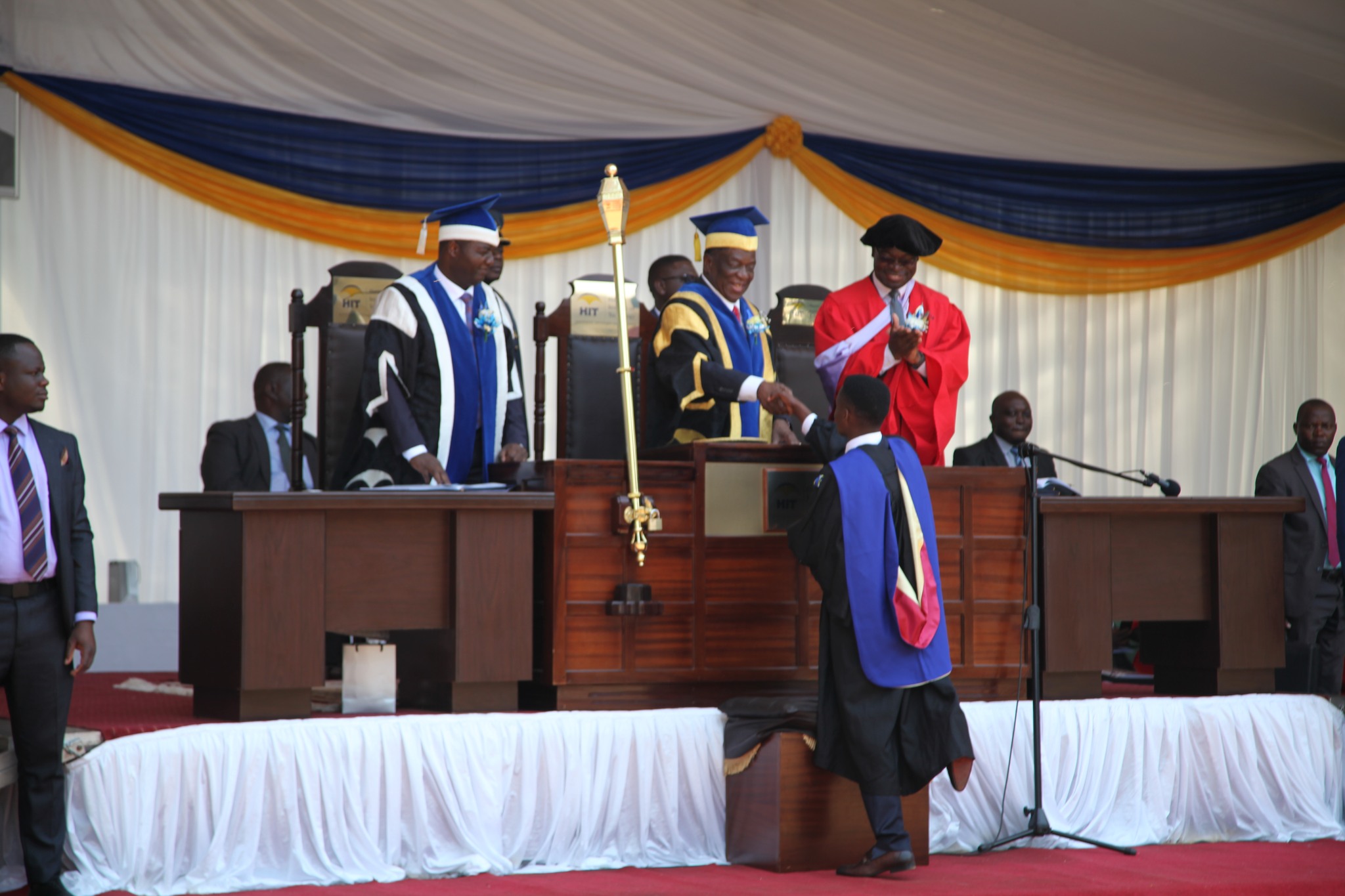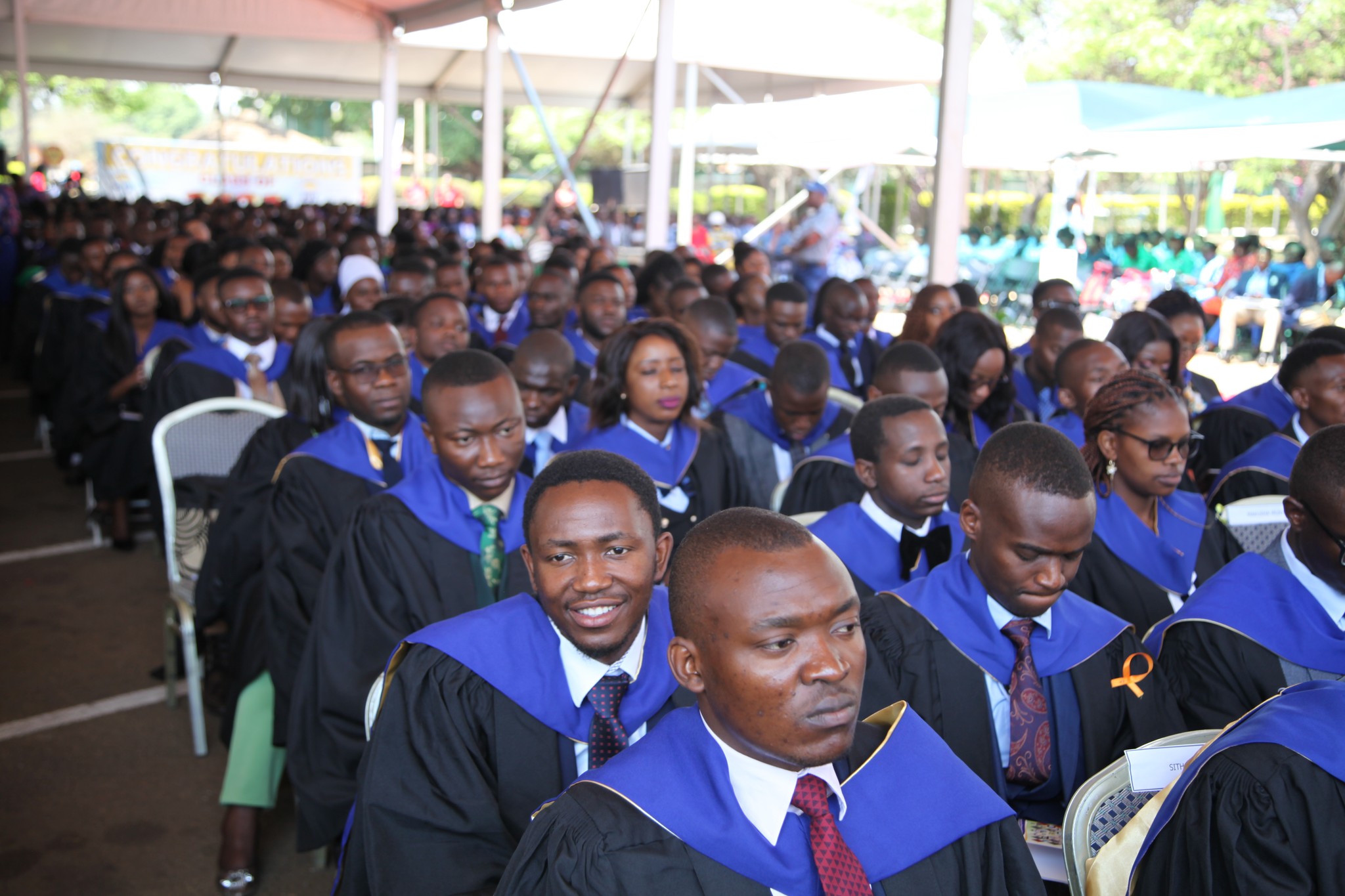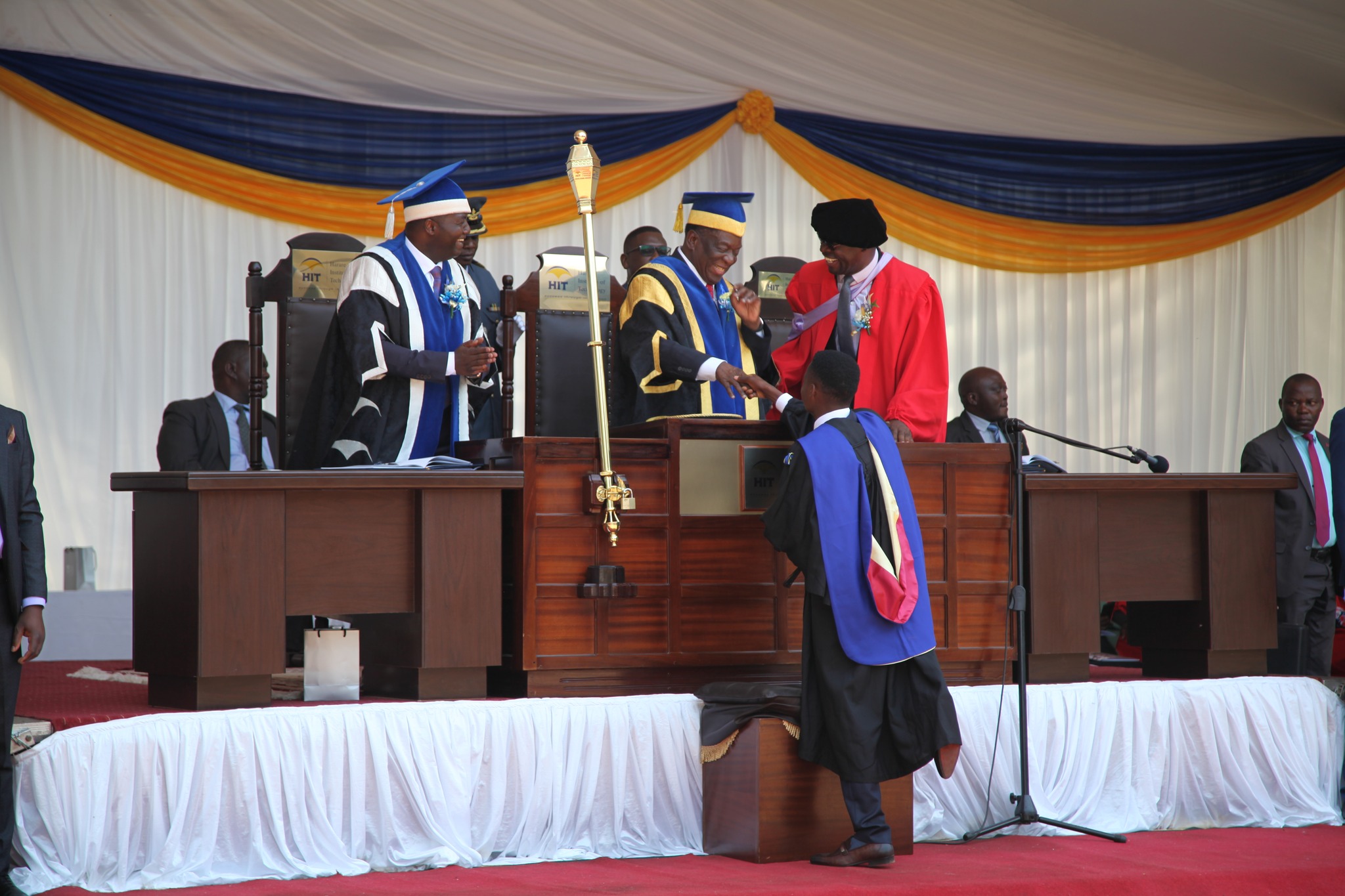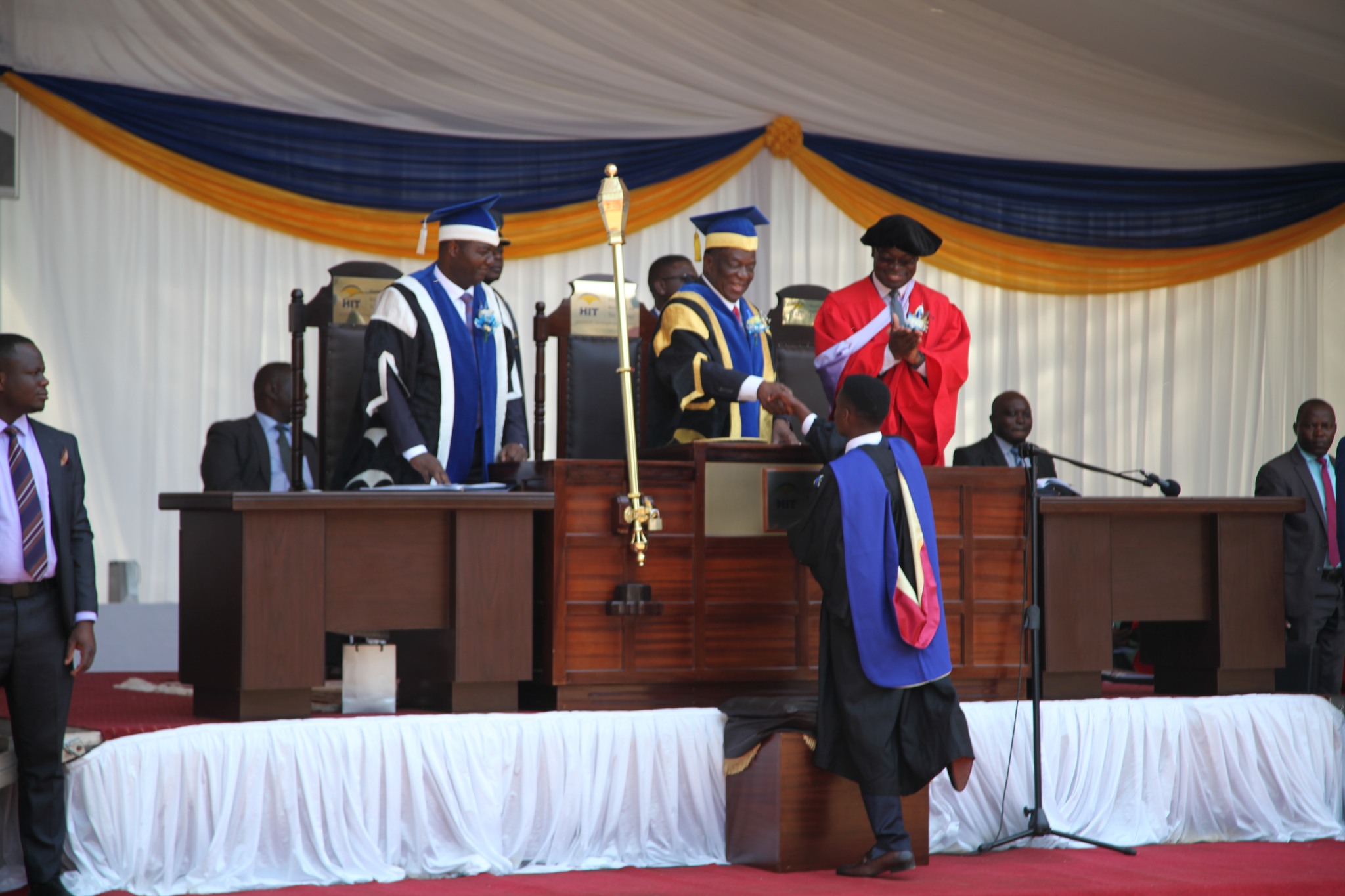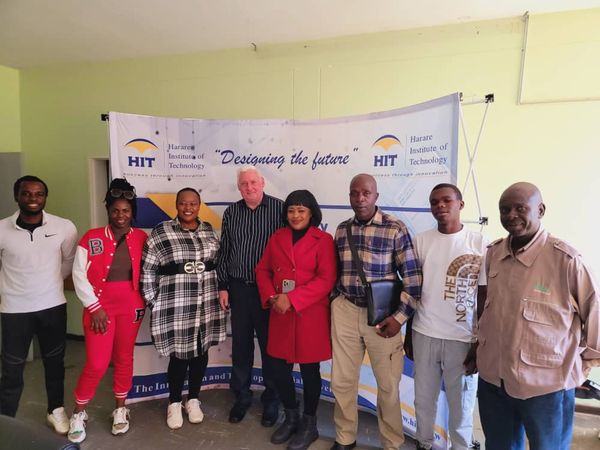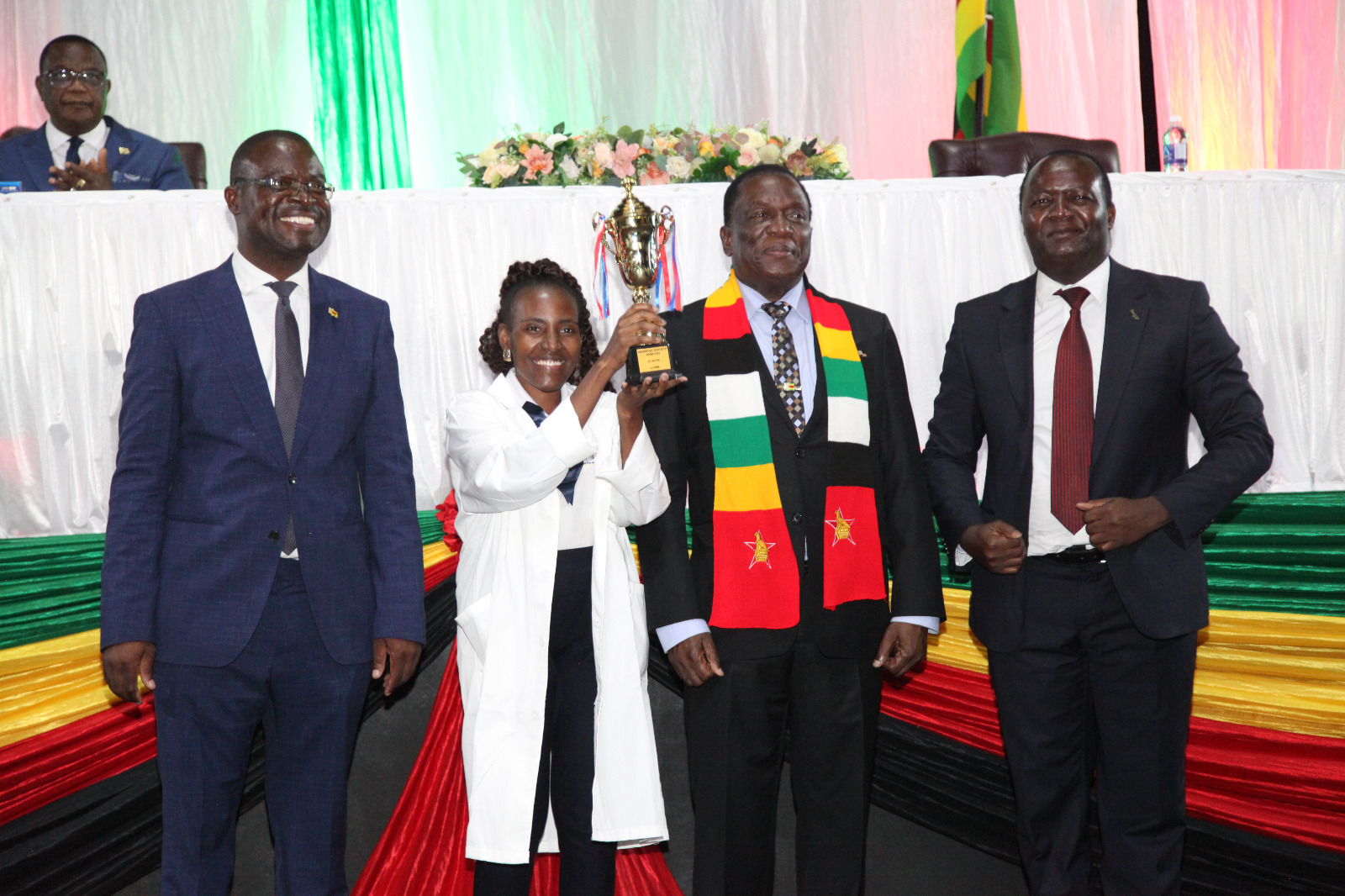President Mnangagwa capped 639 graduands at the Harare Institute of Technology’s 14th graduation Ceremony held on Friday the 6th of October 2023 at the Institute’s Belvedere Campus.
Among the 639 graduates, 38,8 percent were females, while 48 students attained first class degree passes.
This year’s graduation ceremony had 100 more graduates compared to last year’s, demonstrating that more young people continue to invest faith in education as a tool for social transformation.
The President recognised six outstanding graduates, under the Emmerson Dambudzo Mnangagwa Chancellor’s Award, with the overall best male and female students, each pocketing US$1 000. Four best graduating First Class students received US$500 each.
The best male graduating student, Zvikomborero Mufari, who was pursuing a Financial Engineering degree, walked away with US$1 000. “I would not have achieved the feat without the hand of God. “I can’t say it is my intelligence, but I just see the hand of the Lord all over. All my years here, while they were for academic purposes, the journey was also a prayerful one.
“Everything I did, I first dedicate it into the hands of the Almighty. I believe God has taken me this far,” said Mufari.
Yeukai Chihowa , a graduate in Chemical and Process Systems Engineering, said this graduation was a great achievement in her life. “I feel overjoyed, ecstatic because it hasn’t been quite an easy experience. It was a rough and bumpy ride but then I made it through. I intend to venture into the mining industry in the long run, but for now fuels and oils,” she said.
Another graduate, Juda Tarume who graduated with a Master of Technology degree in Strategy and Innovation said the road was never an easy one. “I found the programme so challenging as it was more demanding and I would like to use it to pursue my organisational performances and also allow myself to be in the industry as far as strategy and business viability is concerned,” he said.
In his official address at the graduation ceremony HIT Vice Chancellor, Professor Dr Quinton Chamunorwa Kanhukamwe, said engineering, technology and innovation have entered a period of unparalleled intensity and vivacity, bringing a new round of industrial revolution that is restructuring the global innovation domain and redesigning global economic structures.
“We are witnessing the never-been-seen information technologies, represented by the artificial intelligence, quantum physics, mobile telecommunications, Internet of Things, and block chain among other novel and awesome developments,” he said.
“HIT continues to strategically align itself to the national development aspirations by robustly pursuing the five missions of university service namely research, teaching, community service, innovation and commercialisation (Education 5.0).”
Prof Dr Kanhukamwe said guided by the HIT Act of 2005, they have made concerted efforts to contribute to economic transformation through the provision of technology and engineering solutions, responsive to the needs and challenges across various economic sectors.
He said their strategic plan, Vision 2025 “Designing the Future”, continues to inspire collective impact, playing a pivotal role in the delivery of technology outcomes that are making HIT a key partner in the Second Republic’s modernisation and industrialisation agenda.
The Vice Chancellor also said the university has made significant progress in lithium battery production.
He said the university developed lithium carbonate from 2020 to 2022, however, there was a need to further beneficiate the battery-grade lithium carbonate to produce lithium phosphate which has improved chemical characteristics for battery production.
The Vice Chancellor said HIT managed to produce the required enhanced battery-grade lithium phosphate. “The University has been successful in developing a lithium phosphate 3.2V, 60Ah battery cell, when coupled in either parallel for more voltage or series for enhanced current, the cells will produce sufficient power to drive passenger vehicles.
“Our vision is to start commercial production of lithium batteries for vehicles in 2024,” he said.
Prof Dr Kanhukamwe said the university was churning 639 engineering and technology graduates with a deep sense of mission accomplishment and equipped with the most refined technopreneurial skills and gutsy dare devil-mentality.
“They are the embodiment of Heritage-based Education 5.0, as they are armed with the requisite skills and stamina to set up hi-tech enterprises. Your Excellency and Chancellor, as to the University’s outlook for the future, we expect to accelerate and consolidate the execution of the HIT mandate.
“We will continue to provide a superlative education and continue to be trailblazers in key research areas of our mandate. We will reinforce the development of a research enterprise that is pushing outward the boundaries of knowledge so that we educate talented students at the leading edge of their fields who can meaningfully contribute to the rapid industrialization and modernization of this country”
Apart from HIT’s lithium battery breakthrough, the Institute has other several innovations across all sectors of the economy including agriculture which is the backbone of the nation.
“HIT is working with Kosygin Russian State University and local sister universities to develop mechanisms for improving cotton output. Currently, our national output is at a mere 700kg per hectare as compared to Russia’s and India’s 900kg to 1 100kg per hectare.
“Through our Biotechnology Department, we are currently seized with cotton seed development and improvement. The envisaged outcomes will be an increase in income for the farmers and subsequently forex from exports,” the Vice Chancellor said.
Prof Dr Kanhukwamwe said other gains to be realised are drops in cooking oil prices, clothes, and animal feed.
The Vice Chancellor said while new developments are coming on board, the University is also enjoying the fruits of already established innovations.
“The University continues to design and manufacture oil and dry power distribution transformers at our plant in Chitungwiza. The transformers are being sold commercially,” he said.
He added that the University has also launched three spin-off companies at a time the existing start-ups and spin-offs are now employing 179 people in their entities.
Among them is InstiBio, a spin-off from the Department of Biotechnology that brings industrial biotechnology, medical biotechnology and advanced mushroom technologies to the nation to improve food security through agriculture and horticultural solutions, as well as the health sector through medications.
InstiRad is alos a spin-off from the Department of Radiography, specialising in bringing up accessible and affordable radiography services to disadvantaged and under-resourced communities in Zimbabwe.
HIT is also currently working with Norton Town Council and Norton Hospital in availing various ultrasound services, therefore working towards uplifting and boosting health service provision.
The third company is InstiQuip, a spin-off of the School of Engineering and Technology, which provides machine design expertise, mould design and technology expertise as well as CAD and CIM technologies for the reverse engineering of advanced machine technologies.
“This is increasing the viability of import substitution and the development of equipment suited and maintainable for Zimbabwean circumstances,” said Vice Chancellor Kanhukamwe.
Prof Dr Kanhukamwe said HIT’s research collaborations have increased significantly through partnership with Chinese, Russian, American, Indonesian and Belarussian universities to improve the quality of research and innovation outputs.
“Your university is part of the Russia-Africa University network where we have secured over six partnerships and we are currently carrying out close to fifteen research activities in the fields of machine design, mechatronics, biotechnology, pharmaceuticals, and electronics.
“We have also established a training collaboration with Rwanda’s Ministry of Health where we have enrolled students in the School of Allied Health Sciences Radiography and Ultrasound degree programmes,” he said.
The Vice Chancellor also took time to congratulate President Mnangagwa and Zanu PF for winning the 2023 general Harmonised Elections conducted in a free, fair, transparent, and credible manner. He said the victory demonstrated the great developmental work led by President Mnangagwa in the last five years, which is noticeable across various sectors of the economy.
“The HIT family cherishes your principled visionary, servant leadership and guidance, including your relentless efforts to consolidate the nation’s political, economic, and social status through various policies and practices that are promoting and enhancing our global competitiveness and economic growth,” he said.


